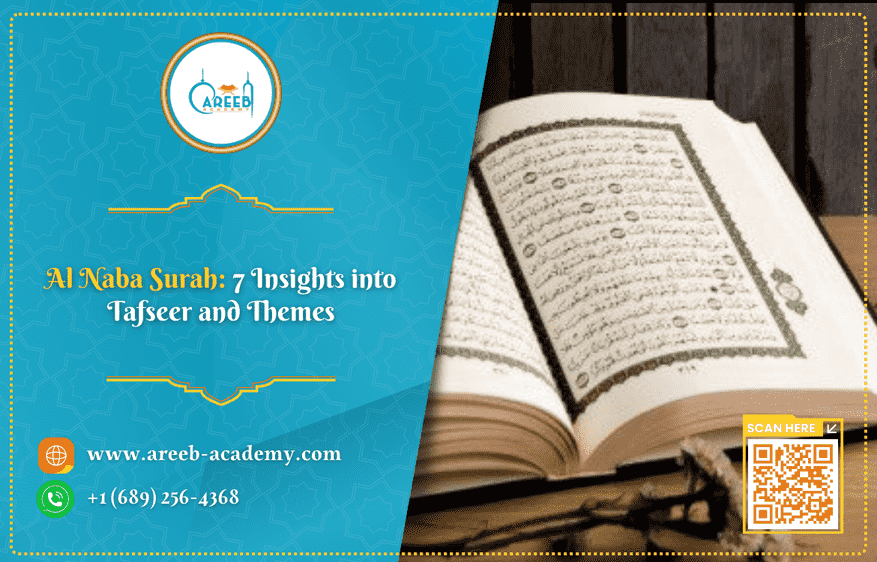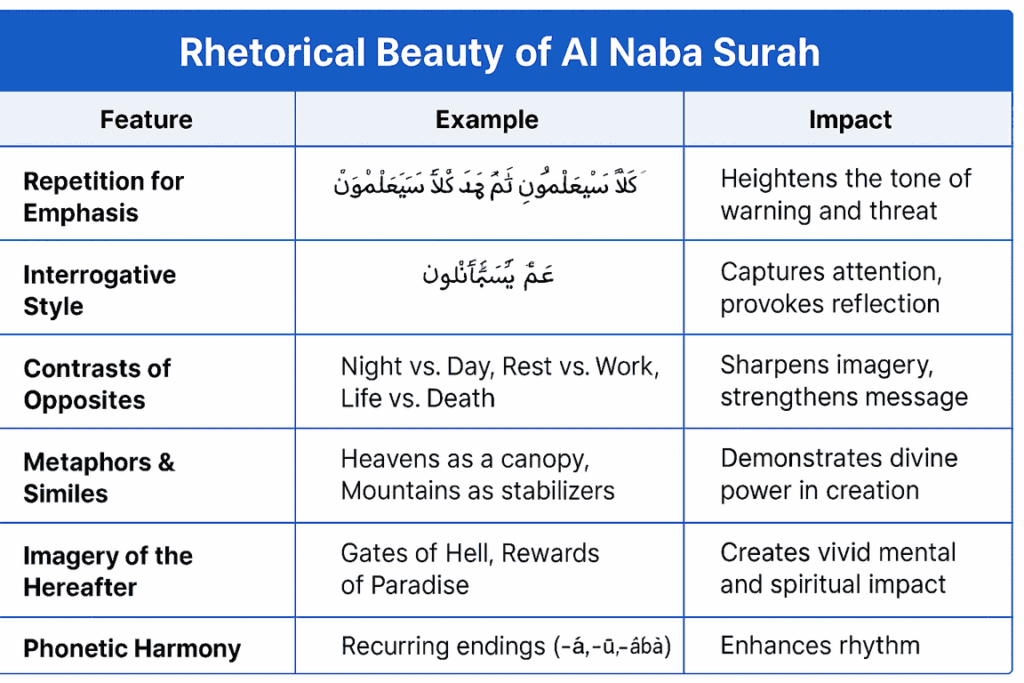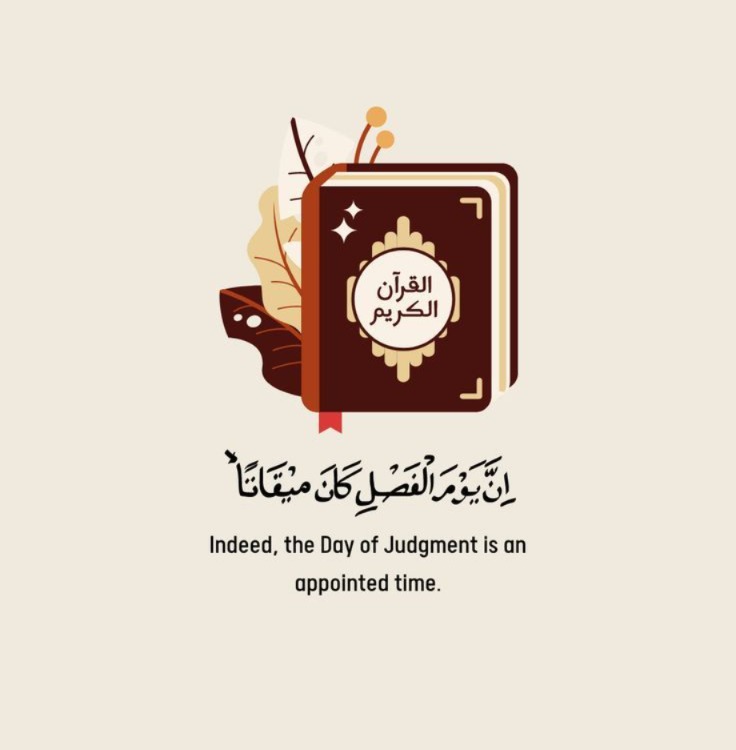
Have you ever wondered what “The Great News” really means? Al Naba Surah, also called The Announcement, is the 78th chapter of the Quran. Revealed in Makkah during the early years of Islam, it contains 40 short but powerful verses. Positioned at the beginning of Juz’ Amma, Al Naba Surah is often memorized by children and new learners because its concise style carries a profound impact.
Importance of Al Naba Surah in Islamic Belief

Al-Naba reminds us of the certainty of the Day of Judgment and our accountability before Allah. Its verses point to natural signs—earth, mountains, night, and day—inviting reflection on creation as proof of divine power. By reflecting on these signs, Muslims are reminded to live with purpose. They know that ultimate justice will be delivered in the Hereafter.
Why Scholars and Students Study Al Naba Surah Today
Scholars and students study Al Naba Surah not only for its theological significance but also for its linguistic beauty. Its rhythmic verses and vivid imagery highlight the eloquence of the Quran. Classical scholars focused on its Tafseer to explain the depth of its warnings and promises, while modern readers find lessons that connect timeless spiritual guidance to everyday life.
Before diving into the detailed insights of Surah Al-Naba, it helps to understand why this chapter is so impactful. Each insight explores a different aspect of the Surah. They cover its historical context, literary style, core themes, and lessons for both past and present. By reflecting on these insights, we can appreciate the depth, wisdom, and timeless guidance within this short but powerful chapter.
.
Insight 1 – Historical Background of Al Naba Surah

Makki Revelation Period
Surah Al-Naba was revealed in Makkah, during the early period of the Prophet’s ﷺ mission. The early Makkan revelations aimed to build the foundation of faith, reminding people of Allah’s oneness, the reality of the Hereafter, and the importance of moral responsibility. Like many short chapters in Juz’ Amma, its verses are sharp, rhythmic, and powerful—designed to awaken hearts and grab the attention of those who were still questioning the truth.
Who Was Al Naba Surah Speaking To
The Surah was primarily directed at Quraysh, who denied the idea of resurrection and mocked the Prophet’s ﷺ message about life after death. They would argue and debate, dismissing the concept as impossible. At the same time, it also spoke to the early Muslims, offering comfort and encouragement. Through its vivid imagery of the Day of Judgment, believers were reminded that their struggle had purpose, and that justice would one day prevail.
The Core Message of Al Naba Surah Today and Then
The central theme of Surah Al-Naba is “the Great News” — the reality of resurrection and accountability. In a society where many were lost in worldly pursuits and dismissive of the Hereafter, this Surah came as a wake-up call. By describing the signs of creation—earth, mountains, night, day, and rain—Allah reminded them that the same power that created life can bring it back again. The Surah put the debates of Quraysh into perspective, turning their attention from doubt to understanding and reflection
Insight 2 – Structure and Literary Style

Verses Breakdown and Rhythm
Surah Al-Naba is made up of 40 short verses, each carrying a sharp rhythm that leaves an impact on the listener. The quick, concise lines create a sense of urgency—perfectly matching its theme about the Day of Judgment. The early verses open with a question that grips the reader, while the middle passages describe scenes of creation and blessings, before closing with vivid imagery of the Hereafter. This progression gives the Surah a natural flow, moving from reflection to accountability.
Linguistic Features and Eloquence
Like many Makkan chapters, Surah Al-Naba uses powerful linguistic tools—repetition, contrast, and striking imagery. The words are carefully chosen, not only for meaning but also for sound, making the recitation unforgettable. For example, the alternation between calm descriptions of nature and intense portrayals of the Afterlife creates a dramatic effect that forces reflection. Its eloquence lies in its simplicity: short words, but deep layers of meaning.
Quranic Style of Argument
The Surah follows a classic Quranic style of argument: first raising a question, then presenting undeniable signs from creation, and finally leading to the conclusion about resurrection and judgment. Instead of philosophical debate, it appeals to both the mind and heart—pointing to everyday realities like the earth, mountains, night, and rain as evidence of divine power. This approach makes the argument universal, timeless, and relevant to anyone willing to reflect.
Insight 3 – Core Themes of Al Naba Surah

Resurrection and Accountability
One of the strongest themes in Surah Al-Naba is the certainty of resurrection. The chapter begins by highlighting the arguments people had about “the great news”—whether life after death was real or not. It makes it clear that every soul will be brought back to life and held accountable. This message wasn’t just for Quraysh at that time—it’s a reminder for all generations that our actions in this world are not without consequence.
Signs of Allah in Creation
To reinforce the reality of resurrection, the Surah points to the world around us: the earth spread out for stability, mountains planted like pegs, night as a cover, and rain that brings life. These signs aren’t random—they are everyday reminders of Allah’s power. If He can create and sustain all of this with precision, then surely, He can bring life back after death.
Justice and the Hereafter
Surah Al-Naba also paints a vivid picture of justice in the Hereafter. The deniers are warned of a blazing punishment prepared for them, while the believers are promised gardens, blessings, and eternal peace. This contrast makes the message clear: ultimate justice may not always be seen in this life, but it will be established perfectly in the next.
Insight 4 – Classical Tafseer of Al Naba Surah
Insights from Ibn Kathir and Al-Tabari

Classical scholars like Ibn Kathir and Al-Tabari explored Al-Naba in depth, explaining its verses with context from the Prophet ﷺ’s life and the Makkan society. They emphasized the Surah’s role in affirming resurrection, illustrating how every sign in creation points to Allah’s power, and reminding believers of accountability in the Hereafter.
Scholarly Debates on Key Verses
Some verses sparked detailed discussion among scholars, such as the depictions of reward and punishment. Scholars debated whether these descriptions should be understood literally, metaphorically, or both, but all agreed on the core message: the certainty of judgment and divine justice.
Consistency with Quranic Themes
Tafseer also highlights that Al-Naba echoes broader Quranic themes—creation, signs of Allah, the fate of the righteous and the disbelievers, and the moral responsibility of humans. It fits seamlessly with the Quran’s overarching emphasis on guidance, reflection, and preparation for the Hereafter.
Insight 5 – Modern Reflections and Interpretations
How Contemporary Scholars Explain It
Modern scholars often focus on the Surah’s universal message: it addresses both faith and reason. They explain how the signs of creation serve as evidence for reflection, and stress the psychological and spiritual impact of accountability—reminding people of purpose beyond the material world.
Lessons for Today’s Society
Al-Naba continues to teach lessons relevant to contemporary life: the importance of moral integrity, awareness of consequences, and responsibility towards others. In a world distracted by immediate gains and temporary pleasures, its message encourages people to pause, reflect, and prioritize meaningful actions.
Relevance for Modern Challenges
From environmental care to social justice, the Surah’s focus on signs in nature and accountability resonates today. Understanding our role as stewards of the earth, and recognizing the inevitable outcome of our choices, helps Muslims align personal, social, and spiritual life with timeless Quranic guidance.
Insight 6 – Spiritual and Moral Lessons
Reminder of Human Accountability
Surah Al-Naba is a gentle yet firm reminder that every action has consequences. It calls us to reflect on our behavior, choices, and responsibilities, reinforcing that nothing escapes Allah’s knowledge. This awareness encourages Muslims to live intentionally, with a sense of purpose and mindfulness.
Developing Taqwa (God-consciousness)
By presenting vivid images of reward and punishment, the Surah nurtures Taqwa, a deep God-consciousness that shapes thoughts and actions. Believers are reminded to stay humble, ethical, and compassionate, knowing that Allah observes every deed, both big and small.
Daily Applications for Muslims
The lessons of Al-Naba are not just theoretical—they can guide everyday life. From honest work and kindness to patience and gratitude, the Surah encourages believers to integrate spiritual reflection into daily routines. Even small actions become meaningful when done with awareness of accountability and divine presence.
Insight 7 – Al Naba Surah in Worship and Memorization
Recitation in Salah
Many Muslims recite Surah Al-Naba in their daily prayers, especially in Juz’ Amma. Its short, rhythmic verses make it ideal for reflection during Salah, reminding the worshipper of resurrection, divine signs, and ultimate justice while connecting heart and mind to the words of Allah.
Virtues of Memorizing It
Memorizing Al-Naba carries spiritual rewards. It helps cultivate discipline, deepens understanding of the Quran’s messages, and strengthens one’s connection to the Hereafter. Children and adults alike benefit from committing it to memory as part of their spiritual growth.
Role in Islamic Education
Al-Naba is often one of the first Surahs taught in Quran schools because of its concise yet powerful message. It serves as a foundation for understanding core Islamic beliefs, moral guidance, and the eloquence of the Quranic language. Studying it equips students with both knowledge and reflection that stays with them for life.
Selected Verses from Surah Al Naba Surah with Tafseer
عَمَّ يَتَسَاءَلُونَ ١ عَنِ النَّبَإِ الْعَظِيمِ ٢
Translation:
“About what are they asking one another? About the great news.”
Tafseer:
These opening verses show how the disbelievers in Makkah questioned and mocked the idea of resurrection. Allah responds firmly, calling it the Great News—the Day of Judgment that no one can escape. This sets the stage for the rest of the Surah, emphasizing the certainty of accountability.
أَلَمْ نَجْعَلِ الْأَرْضَ مِهَادًا ٦ وَالْجِبَالَ أَوْتَادًا ٧
Translation:
“Have We not made the earth a resting place, and the mountains as pegs?”
Tafseer:
Next, the Surah draws attention to the signs of Allah in creation. The earth is prepared as a stable place for life, and the mountains act as pegs, giving balance and stability. The One who created and sustains this precise order surely has the power to bring humans back to life after death.
إِنَّ لِلْمُتَّقِينَ مَفَازًا ٣١ حَدَائِقَ وَأَعْنَابًا ٣٢
Translation:
“Indeed, for the righteous will be attainment: gardens and grapevines.”
Tafseer:
Here, Allah describes the reward of the believers—eternal gardens, abundance, and joy. This depiction inspires hope and encourages believers to live with faith, patience, and trust in Allah’s promises.
Verse 40
إِنَّا أَنذَرْنَاكُمْ عَذَابًا قَرِيبًا يَوْمَ يَنظُرُ الْمَرْءُ مَا قَدَّمَتْ يَدَاهُ وَيَقُولُ الْكَافِرُ يَا لَيْتَنِي كُنتُ تُرَابًا
Translation:
“Indeed, We have warned you of a near punishment—the Day when a man will observe what his hands have put forth, and the disbeliever will say, ‘Oh, I wish I were dust!’”
Tafseer:
The Surah concludes with a powerful reminder: every soul will face the consequences of its deeds. Those who denied the truth will experience deep regret, wishing they had never existed. This stark warning encourages reflection, accountability, and mindfulness in this life.
Lessons and Benefits of Surah Al-Naba
1. Strengthens Faith in the Hereafter
Al-Naba reminds us that life does not end with this world. By describing resurrection, judgment, and the rewards and punishments of the Hereafter, it reinforces belief in life after death and encourages accountability for our actions.
2. Encourages Reflection on Allah’s Signs
Through vivid descriptions of mountains, rain, night, day, and the earth, the Surah invites believers to reflect on Allah’s power and wisdom. Recognizing these signs deepens understanding of the Creator and nurtures gratitude.
3. Promotes Moral Responsibility
By highlighting the consequences of human actions, the Surah motivates ethical behavior, honesty, patience, and compassion. It reminds us that every choice has significance and that living responsibly aligns with divine guidance.
4. Develops Taqwa (God-consciousness)
Regular reflection on Al-Naba encourages mindfulness of Allah in daily life. This God-consciousness shapes thoughts, decisions, and interactions, leading to a spiritually enriched life.
5. Enhances Spiritual Focus in Worship
Reciting or memorizing Al-Naba in Salah or study reinforces its messages and connects the heart to the Quran. Its rhythm and brevity make it ideal for meditation and spiritual reflection.
6. Provides Educational Value
From children learning Quran basics to adults exploring deeper meanings, Al-Naba serves as a foundational chapter. It introduces key Islamic concepts clearly and memorably, making it an essential part of Quranic education.
7. Inspires Contemporary Application
Even today, the Surah’s lessons apply to modern life: ethical living, reflection on natural signs, and awareness of accountability guide personal, social, and environmental responsibility.
Conclusion

Surah Al-Naba, though brief, carries profound messages that resonate across time and place. Reflecting on the seven key insights—from its historical context and Makkan revelation, to its literary brilliance, core themes, classical and modern interpretations, spiritual lessons, and role in worship—helps us appreciate the depth and wisdom of this Surah.
Its timeless importance lies in reminding us of human accountability, the signs of Allah in creation, and the ultimate justice of the Hereafter. By studying and reflecting on Al-Naba, Muslims can strengthen their faith, develop taqwa, and integrate Quranic guidance into daily life.
This Surah encourages us not only to recite and memorize but also to ponder, reflect, and apply its lessons, making it a source of guidance, inspiration, and spiritual growth for every generation.
Understanding Surah Al-Naba is just the beginning of a deeper Quranic journey. At Areeb Academy, we offer structured courses in Quran, Tafseer, Arabic, and Islamic studies—designed to help you not only learn, but truly connect with the Book of Allah.
Whether you’re a beginner or looking to advance your knowledge, our guided programs provide the support, clarity, and inspiration you need.
Join Areeb Academy today and take the next step in your journey of Quranic learning and spiritual growth.


